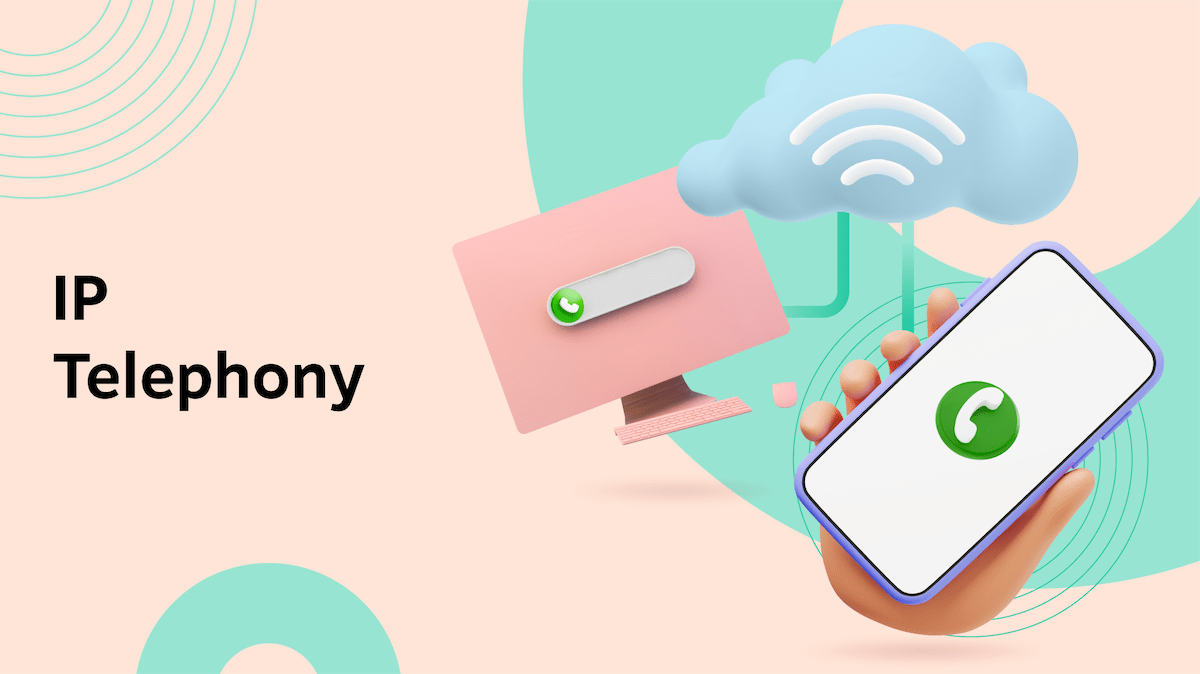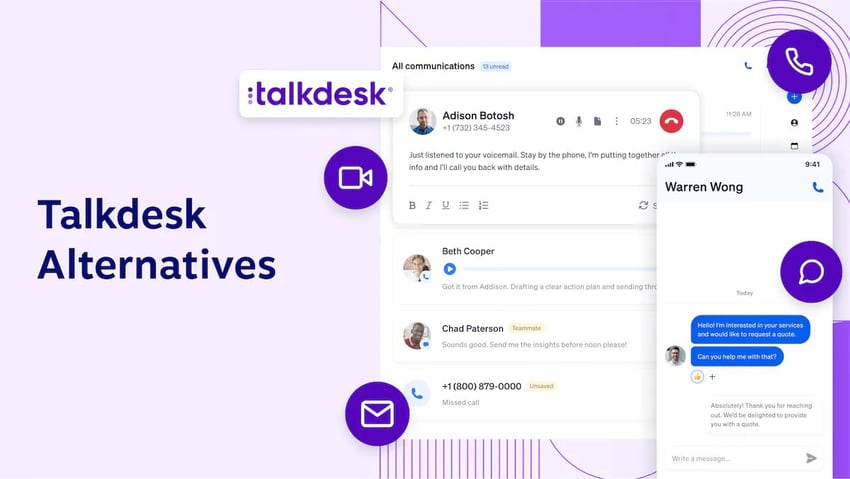For decades, businesses depended on traditional phone systems to stay connected. Those systems have now become obsolete. Internet Protocol (IP) telephony has replaced circuit-switched networks and set the standard for modern communication.
By carrying voice over data networks instead of traditional phone lines, IP telephony has become the core of unified communications. It brings together voice, video, messaging, and conferencing on a single platform, enabling teams to connect and collaborate more efficiently.
The global IP phone system market is valued at over $20 billion and continues to grow each year. Businesses that adopt and build on this technology gain a clear advantage in cost, flexibility, and customer communication.
The focus today is not on adopting IP telephony but on maximizing it. Businesses are now exploring how advanced VoIP phone systems, unified communications, and AI tools built on this foundation can reduce operational costs, increase flexibility, and enhance customer interactions. This guide explains what IP telephony is, how it works, and how it supports the next stage of communication technology.
What Is IP Telephony?
IP telephony (Internet Protocol Telephony) refers to any phone system that uses an internet connection to send and receive voice data. Unlike a regular telephone that uses landlines to transmit analog signals, IP phones connect to the internet via a router and modem.
The first publicly available IP phone arrived on the market as early as 1995. But, compared to a standard phone system, it had low audio quality and was prohibitively expensive.
Since then, internet-based phone technology has improved by leaps and bounds. IP telephony now offers HD voice quality, cheaper running costs, and advanced business phone features. And the need for up-front investment is next to nothing.
IP telephony doesn’t stop at voice calls. Here are some more of its use cases.
- Video calling
- Audio and video conferencing
- Text messaging
- Instant messaging
- Faxing
Watch this short video for a simple, animated breakdown of how IP telephony sends voice over the internet.

How Does IP Telephony Work?
IP telephone systems use the Internet Protocol — the fundamental data communication protocol of the internet and modern networks — or other digital protocols to transfer voice communications over the internet.
IP telephony digitizes analog voice signals into data packets that are then transmitted using the internet Protocol. As data packets traverse networks, they encounter devices such as routers that read packet headers and forward them to their destinations.
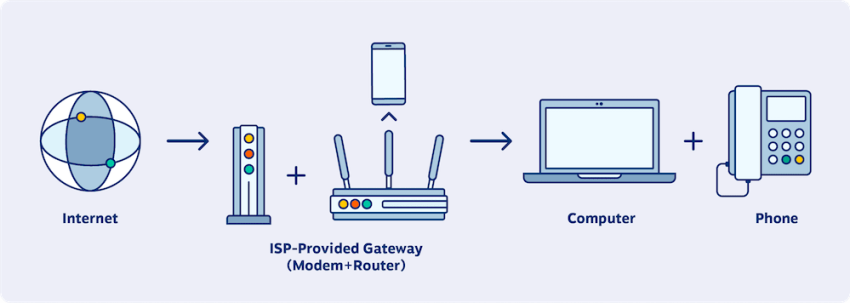
The major protocols that enable IP telephony include SIP (Session Initiation Protocol) for signaling and call session management, RTP (Real-Time Transport Protocol)/RTCP (Real-Time Transport Control Protocol) for transmitting voice media streams, and H.323 (call control and signaling protocol), an early VoIP protocol.
When packets complete their journey, the software reassembles them in the correct order to reconstruct the voice stream.
If you use an IP PBX system, the data is transferred digitally on a Local Area Network (LAN), and then transformed into analog voice signals and sent to the Public Switched Telephone Network (PSTN).
However, because of high hardware and installation costs, IP PBX is no longer the leading solution. Hosted VoIP has become the most popular IP telephony solution. It lets businesses take advantage of advanced PBX features without hardware installed on-site.
Here’s a breakdown of how the VoIP system works:
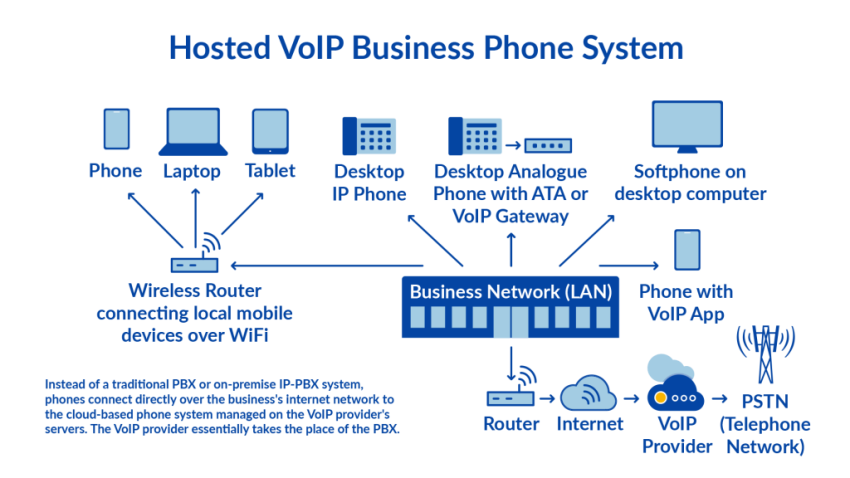
With hosted VoIP, your IP phone sends data (in the form of digital signals) over the internet to your provider. Your provider handles the routing of calls, call queues, and everything else in the cloud. You can also use SIP trunking to connect a legacy IP PBX to a modern VoIP provider to take advantage of missing features.
IP Telephony vs. VoIP
IP and VoIP telephony are often used interchangeably, but there’s a subtle difference between them. IP telephony is the broad concept, while VoIP is the specific technology that enables voice calls.
| Feature | IP telephony (the broad concept) | VoIP (the specific technology) |
|---|---|---|
| Scope | Refers to any phone system using the Internet Protocol (IP) to transmit communication. | A subset of IP telephony that specifically handles the transmission of voice. |
| Analogy | The entire highway system (carries all data). | The cars on the highway (carrying just the voice packets). |
| Example | A unified system including VoIP calls, IP faxing, video conferencing, and instant messaging. | The specific technology that lets you make a phone call over the internet. |
In other words, all VoIP systems are IP telephony systems, but not all IP telephony systems are VoIP systems.
Key Components of IP Telephony Systems
IP telephony systems rely on several key components that work together to facilitate telecommunications over IP networks. These include:
| Component | What it does |
|---|---|
| IP PBX | The “brain” of the phone system. Manages call routing, voicemail, and features. Can be on-premise hardware or hosted in the cloud. |
| IP phones or softphones | The “device” you use. This can be a physical desk phone (IP phone) or a software-based app on your computer or mobile (softphone). |
| VoIP gateway | The “bridge” to the traditional phone systems. This hardware connects your modern IP system to the traditional PSTN for calls to landlines. |
| Session border controllers (SBCs) | The “security guard.” Acts as a firewall specifically for your voice traffic, protecting against attacks, managing connections, and ensuring call quality. |
| Protocols (SIP & RTP) | The “rules” of the call. SIP is the “signal” that starts, maintains, and ends the call. RTP carries the actual voice data packets. |
Benefits of IP Telephony
More software buyers go with VoIP phones than any other type of voice service.
Why are so many businesses making the switch?
1. Reduced costs
Voice over IP is significantly cheaper than traditional phone systems and business plans. Switching to an unlimited VoIP plan can save you up to 50% over a comparable business landline plan.
Nextiva Core, for instance, starts at $15/month per user and includes unlimited calling for the US and Canada. Consolidating voice and data networks saves businesses on long-distance and international call charges.
2. More features without extra hardware
IP telephony offers access to advanced features like advanced call routing, call recording, instant messaging, and video conferencing without having to invest in extra hardware.
Nextiva lets you choose advanced enterprise plans that include all key VoIP features. Businesses can also upgrade and enrich their plans with different add-ons or add more users as they grow. This gives IP telephony strong scalability to support business growth.
3. Increased accessibility
With IP telephony, you can make and receive calls from anywhere in the world as long as you have an internet connection. Users can make and receive calls from their computers, mobile phones, or any device with a softphone or VoIP app installed. This mobility is particularly valuable for businesses with remote or mobile employees.
4. Unified communications
VoIP also makes it a lot easier to integrate voice communications with your CRM and other business tools. Centralizing data and providing consistent customer service across multiple channels (at a lower price) makes IP telephony and VoIP a no-brainer for many businesses.
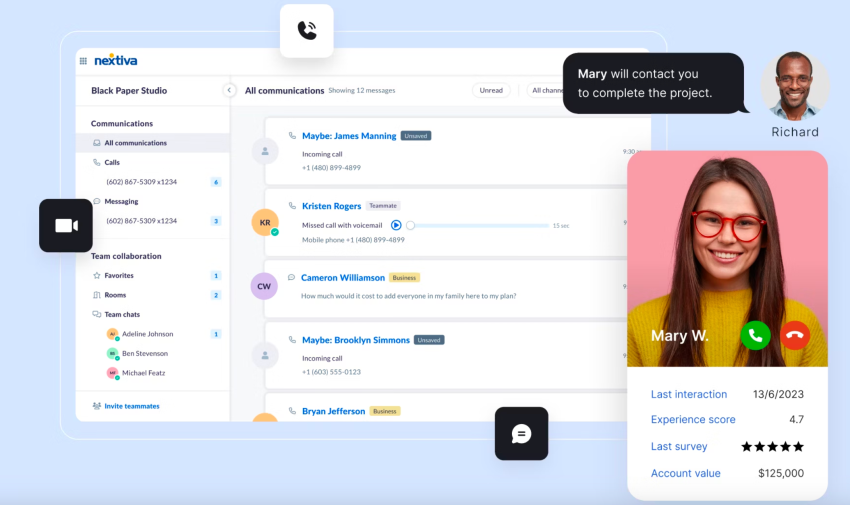
Common Challenges With IP Telephony & Modern Solutions
Early versions of the IP phone system faced reliability and performance issues. But IP telephony service providers today have resolved these challenges through better bandwidth, technology, stronger infrastructure, and smarter telephony network management.
Poor call quality (jitter and latency)
Depending on the bandwidth and stability of your internet connection, VoIP systems can experience unstable connections, choppy audio quality, or dropped calls. You ideally need high-speed internet and a decent internet phone service to make optimal IP calls.
It’s recommended to configure your router’s QoS (Quality of Service) settings to prioritize voice packets over other internet traffic. Leading VoIP providers like Nextiva operate multiple geo-redundant data centers, enabling clear, HD-quality voice calls with stable, fast connections, minimal latency, and no jitter.
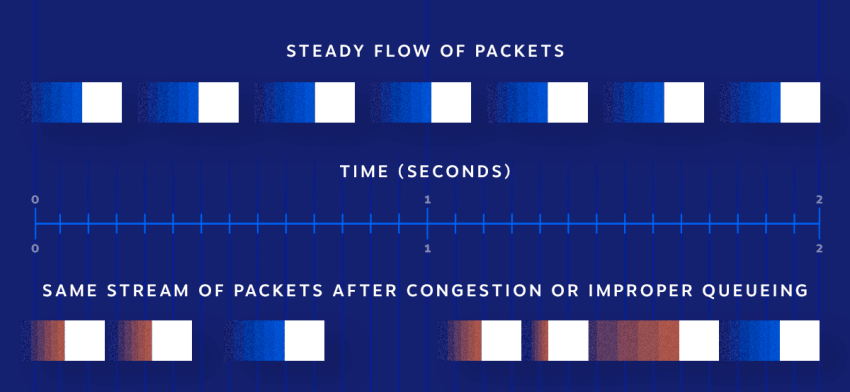
Security vulnerabilities
Because IP calls are transmitted over the internet, VoIP phone systems can be vulnerable to eavesdropping without adequate security measures.
Secure providers ensure more secure communication using TLS and SRTP, the same protocols used for online banking and safe browsing. These standards keep voice data confidential and protected from unauthorized access.
Reliability and internet outages
“What happens during an internet outage?” or “Is IP telephony reliable?” These questions come up again and again, as all IP phone systems inherently rely on the internet.
A failure can easily cause panic, with fears of dropped calls, missed calls, and communication gaps. The good news: Cloud-based IP phone systems offer features like automatic call forwarding and fail-safe operation.
If the power or internet connection fails in the office, incoming calls are automatically forwarded to mobile devices or alternative locations. This ensures uninterrupted and reliable communication through automatic rerouting via Wi-Fi, mobile networks, or alternative service providers — ideal for business continuity and smooth operations.
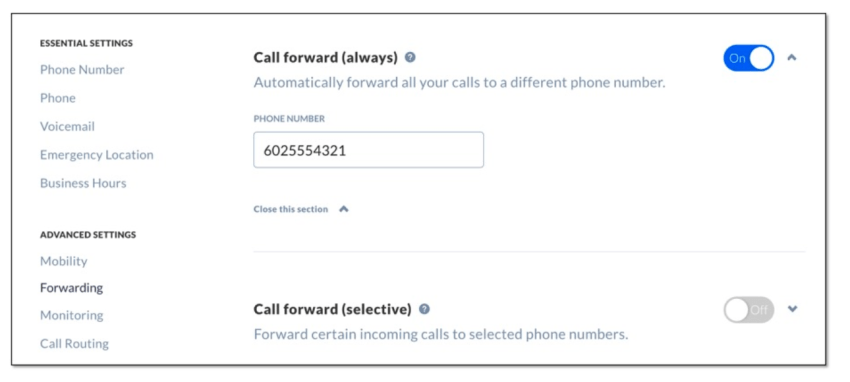
Move Your Business Communications to the Cloud
Want significant cost savings and a new and more multi-line phone system with advanced PBX features?
IP telephony is the foundation for a modern, flexible, and cost-effective communication system. Nextiva’s platform scales to meet your exact needs.
- Get essential, reliable business calling, video, and team chat with our small business VoIP.
- Add advanced call recording, analytics, and web chat to optimize your customer service.
- Unify all your communications with AI-powered transcription, real-time dashboards, and advanced automation.
Our Amazing Service team will be with you every step of the way and ensure that the switch to VoIP is seamless. Speak to an expert today to find the right plan for your business.
Move your phone system to the cloud. On your terms.
Upgrade your company's office communications using Nextiva's battle-tested IP telephony network. Trusted by 100K+ brands.
IP Telephony FAQs
An IP phone is the hardware (like a desk phone) used to make and receive calls over an IP network. Unlike a traditional phone, an IP phone is a mini-computer that connects to your internet router via an Ethernet cable and works with a headset for hands-free use. It’s used to handle HD voice calls, manage call transfers, conduct video conferences (on advanced models), and check colleague availability (presence).
Yes. This is one of the biggest advantages of IP telephony. Providers offer “softphone” apps for your iPhone or Android. This app lets you make and receive calls from your official business phone number on your personal smartphone, keeping your work and personal communications separate.
There are three main types:
Cloud-hosted VoIP (UCaaS): The most popular model. A provider (like Nextiva) hosts and manages the entire phone system in the cloud for a monthly per-user fee.
On-premise IP PBX: An older model where a business buys and maintains all the physical IP PBX server hardware in its own office.
SIP trunking: A service that acts as a “bridge,” connecting an existing on-premise IP PBX to the internet. This allows an older system to make calls over the cloud.
Cisco IP telephony refers to Cisco’s specific ecosystem of IP-based communication products. This includes their line of physical IP phones, their IP PBX server (known as Cisco Unified Communications Manager or CUCM), and their cloud-based platform, Webex, which combines calling, meetings, and messaging.


















 VoIP
VoIP 

